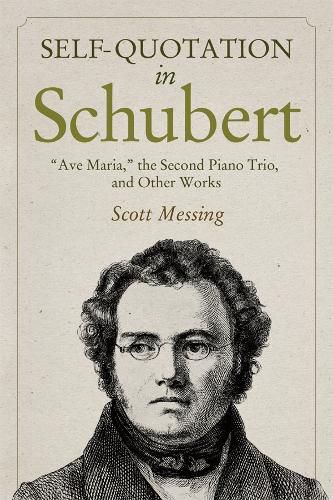Readings Newsletter
Become a Readings Member to make your shopping experience even easier.
Sign in or sign up for free!
You’re not far away from qualifying for FREE standard shipping within Australia
You’ve qualified for FREE standard shipping within Australia
The cart is loading…






Enthusiasts and experts have long relished Schubert’s quotations of his own music. This study centers on a previously unidentified pairing: Ave Maria, one of his most beloved songs, and the Piano Trio no. 2, a masterpiece that holds a unique position in his career. Messing’s Self-Quotation in Schubert interrogates the concept of self-quotation from the standpoints of terminology and authorial intent, and it demonstrates, for the first time, how Schubert’s practice of self-quotation relates to prevailing practices in the late eighteenth and early nineteenth centuries. Messing goes on to analyze in detail the musical relationships between the two works and to investigate thecircumstances that led Schubert to compose each of them.
Ave Maria is one of the few Schubert songs for which we have documentation of some early private performances, and the trio stood at the heart of Schubert’s only public concert devoted to his works. Messing establishes that Schubert sought to convey an associative meaning with this self-quotation, trusting in his contemporaries’ familiarity with the original melody and with Walter Scott’s poem, a text that carried profound resonances in Catholic Vienna. Scrutinizing this evidence yields the symbolic purpose behind Schubert’s allusion to Ave Maria in the piano trio: honoring the recently deceased Beethoven andvalidating Schubert as his legatee.
SCOTT MESSING is Charles A. Dana Professor of Music Emeritus at Alma College.
$9.00 standard shipping within Australia
FREE standard shipping within Australia for orders over $100.00
Express & International shipping calculated at checkout
Enthusiasts and experts have long relished Schubert’s quotations of his own music. This study centers on a previously unidentified pairing: Ave Maria, one of his most beloved songs, and the Piano Trio no. 2, a masterpiece that holds a unique position in his career. Messing’s Self-Quotation in Schubert interrogates the concept of self-quotation from the standpoints of terminology and authorial intent, and it demonstrates, for the first time, how Schubert’s practice of self-quotation relates to prevailing practices in the late eighteenth and early nineteenth centuries. Messing goes on to analyze in detail the musical relationships between the two works and to investigate thecircumstances that led Schubert to compose each of them.
Ave Maria is one of the few Schubert songs for which we have documentation of some early private performances, and the trio stood at the heart of Schubert’s only public concert devoted to his works. Messing establishes that Schubert sought to convey an associative meaning with this self-quotation, trusting in his contemporaries’ familiarity with the original melody and with Walter Scott’s poem, a text that carried profound resonances in Catholic Vienna. Scrutinizing this evidence yields the symbolic purpose behind Schubert’s allusion to Ave Maria in the piano trio: honoring the recently deceased Beethoven andvalidating Schubert as his legatee.
SCOTT MESSING is Charles A. Dana Professor of Music Emeritus at Alma College.